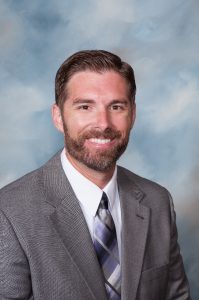Practice Compassion in California Baptist University’s (CBU) Doctor of Psychology (PsyD) in Clinical Psychology Program: Training 21st-century “Good Samaritans” to Respond to a Suffering World
Practice Compassion: Answering the Call

Photo by Danielle MacInnes on Unsplash
On a Thursday afternoon, Dr. Anderson gets the call. A missionary is returning home after a six-month stay in Nigeria. Experiencing symptoms of low mood and a loss of interest in her work, the missionary has been overwhelmed with excessive guilt about whether or not she is “worthy” to share God’s message of hope and reconciliation to a lost generation. After briefly discussing these recurrent symptoms by phone, Dr. Anderson invites the missionary for an intake session at her newly-formed mental health clinic, which specializes in treating church employees struggling with mental health issues. Over the next few months, Dr. Anderson walks alongside the depressed missionary, blending psychological science with the Christian faith in order to help her find meaning and purpose again in her calling to respond to the needs of non-Christians. As a graduate of California Baptist University’s (CBU) doctoral program in clinical psychology, Dr. Anderson was trained in both faith integration and Christian psychology, learning how to combine a Christian worldview with psychological theory so as to serve suffering individuals in Western society. In fact, her dissertation focused on the relationship between depression and rumination and worry among Christian missionaries, which she eventually published in an academic journal. Because of her advanced training at the doctoral level, Dr. Anderson was able to pursue licensure in the state of California as a clinical psychologist, opening a community mental health clinic to respond to the needs of hurting workers within the Body of Christ. In that she was “academically prepared,” “globally minded,” “biblically rooted,” and “equipped to serve,”[1] Dr. Anderson responded to the call, moving towards suffering with compassion and commitment, reminiscent of the “Good Samaritan” in the gospel of Luke.[2]
Practice Compassion: Doctoral Training in Clinical Psychology
As the above example reveals, Dr. Anderson was prepared to respond to the needs of a suffering world, drawing from her training in a clinical psychology doctoral program in the process. But what, exactly, does a clinical psychologist do on a daily basis? According to the Society of Clinical Psychology, the American Psychological Association’s (APA) division for clinical psychologists,

Photo by Ben White on Unsplash
The field of Clinical Psychology involves research, teaching and services relevant to the applications of principles, methods, and procedures for understanding, predicting, and alleviating intellectual, emotional, biological, psychological, social and behavioral maladjustment, disability and discomfort, applied to a wide range of client populations. In theory, training, and practice, Clinical Psychology strives to recognize the importance of diversity and strives to understand the roles of gender, culture, ethnicity, race, sexual orientation, and other dimensions of diversity.[3]
In other words, clinical psychologists work in a variety of contexts, offering direct services to consumers of mental health services (e.g., psychotherapy, psychological assessment), teaching in a plethora of settings (e.g., higher education), and conducting research (e.g., investigating new treatment approaches for depression and anxiety), to name just a few professional activities. When working in such settings, the aim is to employ psychological principles to respond to the mental health needs of the people being served, taking clinical judgment (e.g., experience) and context (e.g., culture, family-of-origin) into consideration. As you can tell from this definition, clinical psychologists have the opportunity to use their advanced training in a variety of ways, which is extremely important in the rapidly changing world of integrated healthcare.
Photo by rawpixel on Unsplash
Like Dr. Anderson, you may feel a calling to help people in need within one of the many healthcare professions in the 21st century. Therefore, choosing the right profession may be an important next step as you decide which path to take. But why, precisely, should you consider becoming a clinical psychologist, as opposed to many of the other noble healthcare professions? Stated differently, what is in store for you, career-wise, if you obtain a doctorate in clinical psychology? First, obtaining advanced clinical training at the doctoral level can help you develop the requisite skillset to competently, effectively, and ethically meet the psychological needs of a suffering world. Second, doctoral training in clinical psychology prepares you to attain psychology licensure in the state of California, which means you have the flexibility to pursue a wide variety of career endeavors. Third, a doctorate in clinical psychology can prepare you to lead an organization or develop innovative ways to respond to a suffering world, possibly carving out a new path that has yet to be traveled upon. Fourth, by balancing the practice and science of clinical psychology, you will be able to apply sound principles and methods, caring for a suffering world with a commitment to offer services that actually work. Ultimately, completing a doctorate in clinical psychology equips you to respond to a suffering world with compassion, reminiscent of the story of the “Good Samaritan” in Luke’s gospel.[4]
Practice Compassion: California Baptist University’s (CBU) Doctor of Psychology (PsyD) in Clincial Psychology Program
As the next step, assuming you have decided to pursue a doctoral degree in clinical psychology and psychology license in the state of California, why might you apply to California Baptist University’s (CBU) Doctor of Psychology (PsyD) in Clinical Psychology Program? First, in the CBU PsyD Program, we are committed to helping you develop into a competent and effective clinical psychologist, offering mentoring experiences to walk with you on this important journey. To be sure, our faculty are dedicated to staying current with the clinical psychology literature, contributing in innovative ways with original research, intervention programs, and so forth. Second, we believe strongly in individual and cultural diversity, which means we have regular conversations—both formally and informally—in a variety of contexts on the intersection between diversity and clinical practice to help you sensitively respond to the unique cultural needs of the people you will be serving. Third, we are firmly committed to helping you understand, draw from, and contribute to the peer-reviewed psychology literature, meaning you will be learning to interact with original sources to apply this understanding to the populations you serve. Fourth, as a Baptist institution, we want to train you to work effectively with Christian clients, helping you develop the ability to understand a Christian worldview so as to meet the unique needs of suffering Christians.

Photo by Andre Hunter on Unsplash
From the first day of class, to walking across the stage at graduation, to celebrating licensure, we are dedicated to helping you to grow into the identity of a clinical psychologist. Therefore, the CBU PsyD Program offers a clinical training sequence so you can develop into a practitioner, along with a research and dissertation sequence so you can better understand what it takes to develop into a scholar. In fact, CBU PsyD core faculty are currently working on a variety of projects within the Center for the Study of Human Behavior. Combined with other training opportunities, the five-year CBU PsyD Program will work to equip you with the competencies necessary to build a career in a variety of contexts and settings, (a) providing intervention and assessment services in non-profit, government, church, medical, private practice, forensic, military, or other settings, (b) working in higher education as a professor, (c) offering consultation services to organizations, or (d) conducting research to contribute to the peer-reviewed psychology literature in an original way.
Practice Compassion: Psychology Licensure
To conclude, why might you choose to pursue a psychology license, rather than a master’s-level license (e.g., marriage and family therapist [MFT], licensed professional clinical counselor [LPCC], licensed clinical social worker [LCSW]), in the state of California? In other words, why devote the additional time, energy, and finances? Certainly, the above master’s-level licenses each offer unique career paths, providing the opportunity to contribute to the mental health field in important ways with dedication and purpose. However, a few key features differentiate a doctoral-level licensed clinical psychologist. First, a licensed psychologist is trained to put an emphasis on the science of clinical psychology (e.g., evidence-based practice), working with a wide spectrum of populations and disorders. Second, a licensed psychologist is prepared to wear a variety of “hats,” such as “practitioner,” “researcher,” “educator,” “trainer,” “consultant,” and “writer.” Third, a licensed psychologist can offer both intervention and assessment services when responding to a suffering world and striving to meet the needs of consumers of mental health services. Fourth, a licensed psychologist, drawing from his or her doctoral education in clinical psychology, is prepared to contribute to the psychology literature in an original manner in the form of publishing textbooks, workbooks, or other important resources. Finally, building on his or her doctoral degree, a licensed psychologist is prepared to pursue a tenure-track position in higher education, training the next generation of students in a university or college setting.
Practice Compassion: Next Steps
Photo by rawpixel on Unsplash
Above all else, in the CBU PsyD Program, we want to train you to practice with compassion, responding to a suffering world with a servant’s heart in order to truly become a 21st century “Good Samaritan.” Like Dr. Anderson, we want you to be able to confidently respond to the call—where will you be in five or ten years when the telephone rings? Will you have the advanced training necessary to ethically, competently, and effectively meet the needs of the person on the other end of the line? Consider joining us in our commitment to respond to a suffering world with compassion, drawing from the science and practice of clinical psychology. Please visit our webpage and submit your application now: www.calbaptist.edu/psyd. We have a short introduction video to tell you more about the program and are still accepting applications for a fall 2019 start date. I look forward to speaking with you further about our commitment to training you as a clinical psychologist.
Notes
[1] https://calbaptist.edu/about/mission
[2] Luke 10:25-37.
[4] Luke 10:25-37.
 Joshua Knabb, PsyD, ABPP
Joshua Knabb, PsyD, ABPP
Director, PsyD Program
Associate Professor of Psychology
California Baptist University
College of Behavioral and Social Sciences
8432 Magnolia Avenue
Riverside, CA 92504
(951) 343-4405 (phone)/(951) 343-4569 (fax)/jknabb@calbaptist.edu
Check out the other posts in the series here:
http://blogs.calbaptist.edu/cshb/2019/02/25/introducing-the-graduate-school-blog-series-a-story/
http://blogs.calbaptist.edu/cshb/2019/03/11/ms-sport-and-performance-psychology-program-at-cbu/
http://blogs.calbaptist.edu/cshb/2019/03/25/what-is-marriage-and-family-therapy/
http://blogs.calbaptist.edu/cshb/2019/04/01/forensic-psychology/
Your blog was very pleasing to read and gave me a lot of insight on what a Doctor of Psychology in a Clinical Psychology Program can offer! I enjoyed the breakdown of the different topics that are involved in this program and how they will help you in your future decisions.
This is a great overview of the PsyD program and what it has to offer! Practicing compassion and learning how to use is effectively is something that needs to be learned. The way this program is broken down displays that compassion is its primary focus and will help those in need. Thank you for such a great insight.
Thank you for the informative post Dr. Knabb! I appreciate and respect individuals who are able to take God’s word and apply it to the behavioral sciences. Sometimes we make the mistake of seeking the answers for life’s problems from science alone. There are just some things that science can’t answer and that’s why we must go to the scripture. It is a blessing to see programs like PsyD train students how work with both the Christian world and the secular.
Dr. Knabb, thank you for sharing this blog post and breaking down the differences in clinical psychology and the compassion that you share in that process. The variations, process, and possible outcomes and cases were made clear through this post. How you handle each different situation is shown by your explanation starting with the missionary who felt inadequate to the instances of differing in health care and clinical psychology health care. I feel better educated about what this program offers. Thank you again for sharing how we can all better help the rest of the world in this psychology major and beyond.
Dr. Knabb,
Thank you for sharing your thoughts in the light of this beautiful Bible passage about the unity, care, compassion, and forgetting about differences. Your words are encouraging and show what psychology is based on in the first place – helping people and restoring their strengths. I love how you demonstrated the connection between God’s calling to the mission and the field of psychology.
Thank you fro your encouragement.
Thank you for sharing this blog Dr. Knabb. It gave great incite on the impact that us students can make on this world when we further our degree. Responding to the call to care for others and being a servant for God.
Dr. Knabb,
Thank you for sharing your thoughts in the light of this beautiful Bible passage about the unity, care, compassion, and forgetting about differences. Your words are encouraging and show what psychology is based on in the first place – helping people and restoring their strengths. I love how you demonstrated the connection between God’s calling to the mission and the field of psychology.
Thank you for your encouragement.
This blog was incredibly informative, I appreciate the realism brought forth in the beginning. To connect a realistic life situation/crisis to actual application of clinical practice (learned at CBU) really adds value and weight to my understanding of Christianity and psychology. As an undergraduate student, I know I am barely scratching the surface of the psychology world, having blogs such as this keeps up a certain level of relevance and genuine interest in various branches of Psychology. I am very interested in the PSYD and Clinical Psychology programs here at CBU. Answering the call, by means of professional compassion has my attention. I understand that clinical psychology is incredibly broad. It seems the in-depth portion of this blog is attempting to explain why a student should pursue higher education in clinical psychology. It is very convincing; however, I couldn’t help but notice the implied mission of being a Christian clinical psychologist, which is to ethically meet the psychological needs of a suffering world. I am a bit of a realist, and having first responder experience I know that not everyone can be helped, or even desire psychological assistance. This fact alone may sound pessimistic; however, I highly appreciate the people out there who do not let this fact intimidate them and their genuine desire to ethically meet the needs of a suffering world. The number of hurt people in this world is limitless, my experience tells me that it takes a very caring and special individual to voluntarily lift and sometimes share other people’s burdens.
Great thoughts, Joshua. You’re right! Not everyone wants to be helped. Part of the training the PsyD program provides in in preparing students to help reluctant (sometimes called “resistant”) clients to see the benefits of pursuing treatment. That said, sometimes one of the most helpful and empowering things we can do is to make it okay for clients to say no to treatment and to leave the door open for them to return when they are ready, rather than trying to be yet another person forcing their hand in life. I hope you’ll consider bringing your first responder experience to bear in a doctoral program like CBU’s. We need good men and women who are willing to step up to help a suffering world and become leaders in the field!
Pingback: Introducing the Graduate School Blog Series: A Story | Center for the Study of Human Behavior
Pingback: Forensic Psychology | Center for the Study of Human Behavior